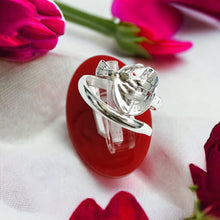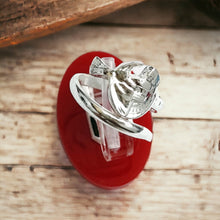
The Silver God Seth Adjustable Ring is a contemporary piece of jewelry inspired by the ancient Egyptian deity Seth, known for his association with chaos and protection. This ring combines modern design with historical symbolism, offering an adjustable fit for comfort. Crafted in silver, it pays homage to the rich mythology and artistry of ancient Egypt, merging historical reverence with current fashion trends.
- History: Ancient Egyptian deity Seth associated with chaos, desert, storms.
- Spiritually: Represents power, strength, protection from negativity.
- Talisman: Protective charm against evil, chaos, and adversity.
- Handmade: Crafted with intricate detail and care.
- Healing: Believed to promote emotional balance and inner strength.
- Material Silver: Conducts energy, enhances intuition, purifies negativity.
- Symbolism: Seth's energy embodies resilience, transformation, and renewal.
- How to Wear: Adjust to fit comfortably on any finger for constant protection and empowerment.
History Side For Those Who Are Interested
Seth, also spelled Set, is one of the most complex and intriguing deities in ancient Egyptian mythology. Throughout history, he has been depicted as both a revered god and a feared adversary, embodying various aspects of chaos, violence, and protection. The history of Seth is deeply intertwined with the evolution of Egyptian religious beliefs and societal dynamics over millennia.
Origins and Early Development:
The origins of Seth can be traced back to predynastic Egypt, where he likely represented natural forces such as storms, desert winds, and the untamed wilderness. In early mythology, he was often depicted as a powerful animal, such as a wild boar or a mythical creature with an indeterminate form. As Egyptian society became more structured, Seth's character underwent significant transformations to align with the changing religious and political landscape.
Consolidation of Seth's Role:
During the early dynastic period (circa 3100–2686 BCE), Seth began to assume a more prominent role within the Egyptian pantheon. He was increasingly associated with concepts of kingship, foreign lands, and the chaotic forces that threatened Ma'at, the cosmic order. Despite his connection to chaos, Seth was also viewed as a protector deity, particularly against the forces of disorder that lurked beyond Egypt's borders.
Conflicts with Osiris and Horus:
One of the most enduring myths involving Seth revolves around his rivalry with his brother Osiris, the god of the afterlife, and Osiris' son Horus, the god of kingship. According to legend, Seth grew envious of Osiris' power and popularity, leading him to plot his brother's demise. Seth's actions culminated in the murder of Osiris, which sparked a prolonged conflict between Seth and Osiris' son Horus for control over the Egyptian throne.
In this conflict, Seth was often portrayed as a malevolent force seeking to usurp the rightful heir to the throne. Despite his cunning and ferocity, Seth was ultimately defeated by Horus, who emerged triumphant and became the rightful ruler of Egypt. However, Seth's role in Egyptian mythology was not solely confined to villainy; he also served as a vital symbol of strength, resilience, and the ability to overcome adversity.
Symbolism and Worship:
Despite his association with chaos and violence, Seth was also venerated as a protective deity in certain contexts. In times of war or social upheaval, the ancient Egyptians would often invoke Seth's name for strength and courage in the face of adversity. Additionally, Seth was sometimes depicted as a defender of the sun god Ra during his nightly journey through the underworld, highlighting his multifaceted nature as both a destructive and protective force.
Over time, Seth's worship waned as other gods rose to prominence within the Egyptian pantheon. During the New Kingdom period (circa 1550–1070 BCE), his cult became increasingly marginalized, and he was often demonized in religious texts and iconography. Nevertheless, Seth continued to hold a place in Egyptian mythology as a complex and enigmatic figure, embodying the duality of chaos and order that permeated ancient Egyptian beliefs. Today, the legacy of Seth endures as a testament to the rich and intricate tapestry of Egyptian religious thought.











